When was the last time you were playful? Where you let go of seriousness and played a little bit? If you have a small child, or a grandchild, it was probably in the last day or so. When was the last time you were playful or laughed in a yoga class? Play is good for the developing brain, but what about adults?
I ask these questions because I see the seriousness all around me. In yoga class, faces are set with grim determination to do this pose or get that pose just right. Who said that yoga must be serious? I love throwing in a yoga pose that is twisty-turny and challenging. Everyone in the room is trying on a pose that they are pretty sure they can’t do, engaging with the people around them, and someone gets it and someone falls and laughter erupts. I see people connecting with each other on their mats and cheering each other on and giggling. Faces change and the energy in the room changes. Yes, people are not in their bodies as they cheer a yoga friend on, but they are establishing connection with someone else. In a world where we are becoming more divided from each other, where as many as 40% of us may have attachment issues, that moment of connection and laughter with someone in a yoga class can be a bright light in an otherwise dull day.
Yoga classes are not accessible to everyone, every day. Laughter Yoga is. Don’t have a laughter yoga class in your area, go to youtube, look up your favorite comedian and laugh at every joke, even if it isn’t funny. When stimulated with hugs, or laughter, or yoga, and other things, our brains release oxytocin, otherwise known as the hugging hormone or bonding hormone. Oxytocin makes us feel good. So, get out there and play, laugh, or hug today. You will feel better!
In this newsletter, you will find new research on Yoga as an adjunct treatment for depression, yoga benefits in inmates, and the benefits of yoga nidra in psychiatric nurses. There is a new online class starting in August that features Hand Gestures. Plus, two book reviews, one from LFYP Deirdre Fay.
Happy reading!
Rose Kress
Director, LifeForce Yoga
Research: Yoga as Adjunct Treatment for Depression
This study, just published in Psychological Medicine, indicates that when people have persistent depressive symptoms, despite anti-depressant treatment, the benefits of yoga may make a difference in their lives, but that the positive outcome will take longer. In the largest randomized controlled trial to date of difficult-to-treat participants with persistent depressive symptoms, Lisa Uebelacker of Brown University and Butler Hospital, and her colleagues found that though there was no significant improvement right after the intervention as compared to a health education control group, over the length of the interview and follow-up period, those who took part in the yoga intervention had lower levels of depression than the education group — at 6 months, 51% of the those who took yoga had a response, which was defined as more than a 50% reduction in symptoms, compared with 31% of the education group. Those in the yoga group also had significantly better social functioning and overall health. According to the researchers, no other study to date has used a comparably difficult-to-treat group.
Read more here.
Research: Psychological Benefits of Yoga for Female Inmates
Yoga has been going behind bars for many years. This new study looked at the psychological benefits of a trauma-focused yoga practice on female inmates in South Carolina. The inmates at correctional facilities applied to participate in a ten-week yoga program. 33 inmates were part of the treatment group, while 17 made up the control group. Those in the control group joined the next class offered, so everyone received the trauma-focused yoga. Measurements of stress, depression, self-control, anxiety, self-awareness, and rumination were collected from both groups before the yoga class and upon completion of the program. The yoga group reported significant decrease in depression and stress as well as an improvement in self-awareness. While the yoga group also reported a reduction in anxiety and an increase in self-control, these changes were not statistically significant.
Read the abstract here.
Research: Using Yoga Nidra to Improve Stress in Psychiatric Nurses in a Pilot Study
Given the high stress and fast-paced healthcare system, nurses are often overworked and lacking self-care strategies. This study looked at the benefits of a daily yoga nidra practice. In a pilot study, nine psychiatric nurses participated in six weekly sessions of yoga nidra. Measures of sleep, stress, and muscle fatigue were obtained to determine whether yoga had a positive impact upon quality of life and stress. While the study was small, the nurses reported a reduction in perceived stress levels and muscle fatigue.
This study speaks to the need for self-care among health-care and mental health-care providers. While everyone benefits from a practice of yoga nidra, caregivers routinely short change themselves in favor of patients, clients, students and loved ones. Are you making sure that you get a daily dose of self-care? If not, try adding a daily yoga nidra practice. All you need to do is press play.
Read the abstract here.
NEW Online Course:
Hand Gestures to Manage Your Mood: LifeForce Yoga Mudra
Led by Rose Kress, ERYT-500, LFYP-2, C-IAYT, YACEP, Director of LifeForce Yoga
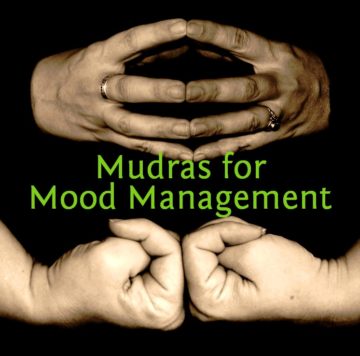 Cost: $90 (whole series), $30 per webinar
Cost: $90 (whole series), $30 per webinar
Dates: Wednesdays, August 2, 9, 16, & 23
Times: 4:00 – 5:15pm PST / 7:00 – 8:15pm EST
Hand gestures, called mudras, can change the breath and energy states. They are a yoga practice that is portable and mudras can be practiced anywhere, anytime. Every individual receives the effect of the mudra in a similar way, while subtle differences may be present. These hand gestures have a long tradition of practice within yoga and Buddhism. Mudras exist within Western culture, too, such as the peace sign, the OK sign, and even that hand gesture that we use when driving to signal anger and aggression.
In this powerful four-week online program, experience the influence of mudras on your mood state. Each week has a different theme with 4 – 5 different mudras. These mudras are categorized for ease of teaching. However, you may find a mudra to be profound when you do not expect it.
Register here
Sign up by June 8th and receive a $10 rebate!
Yoga for Mood Management: LifeForce Yoga Practitioner Training – Level 1
Kripalu Center, Stockbridge, MA
July 9 — 16, 2017
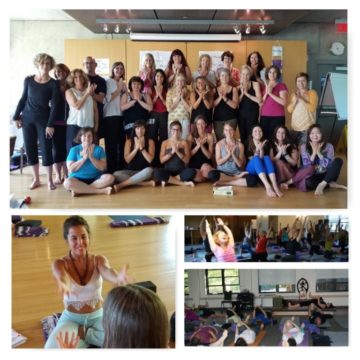 The seven-day LifeForce Yoga Practitioner Training makes its return to the Kripalu Center. This year’s program is co-led by Amy Weintraub and Rose Kress. This training is an opportunity to dive into LifeForce Yoga like never before. After seven days in the beautiful Berkshires you will feel lighter, brighter, and filled with enthusiasm for your home practice. Days begin with an early morning guided yoga, meditation, and chanting practice, followed by a silent breakfast. Daily sessions include evidence-based experiential techniques, demonstrations, and practicing in partners. A 160 page manual with pictures, explanations, and scripts is included.
The seven-day LifeForce Yoga Practitioner Training makes its return to the Kripalu Center. This year’s program is co-led by Amy Weintraub and Rose Kress. This training is an opportunity to dive into LifeForce Yoga like never before. After seven days in the beautiful Berkshires you will feel lighter, brighter, and filled with enthusiasm for your home practice. Days begin with an early morning guided yoga, meditation, and chanting practice, followed by a silent breakfast. Daily sessions include evidence-based experiential techniques, demonstrations, and practicing in partners. A 160 page manual with pictures, explanations, and scripts is included.
Review: Attachment-Based Yoga & Meditation for Trauma Recovery: Simple, Safe, and Effective Practices for Therapy
Author: Deirdre Fay
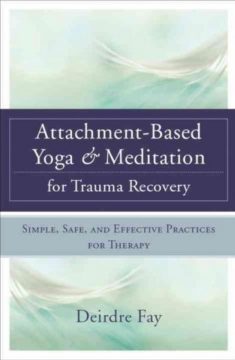 Reviewed by Rose Kress
Reviewed by Rose Kress
I met Deirdre Fay several years ago when she came to take the LifeForce Yoga Practitioner Training. She had a depth and breadth of knowledge that was admirable and easy to understand, fun, and approachable. I found Attachment-Based Yoga & Meditation for Trauma Recovery to be just like Deirdre: deep and expansive in its wisdom, while being easy to understand, fun, and approachable. This was not a quick read, instead, I wanted to savor the information, re-read pieces and even full chapters. Coming in at just over 300 hundred pages, this book is both a tome and a treasure, to be savored again and again.
Fay begins the journey of this work from the perspective of her personal history – a time when her own trauma erupted. She was at Kripalu in its ashram days (a spiritual and religious retreat), practicing yoga and meditation when her own trauma reared its head. She went from being active, engaged, and the experience of herself as bliss and clarity, to disconnected, terrified, and numb. This experience, which may be familiar to many readers, led Fay to discover the intersections between social work, attachment theory, yoga, and mindfulness. Attachment-Based Yoga & Meditation for Trauma Recovery, is the culmination of her exploration and work, thus far.
This work is accessible, peppered with supporting research and client anecdotes. There is also a depth to this book that may make you want to dive in, or revisit certain sections for greater understanding. Personal patterns may be illuminated and finally understood as you make your way through these pages. You might even walk away with a deeper understanding of trauma and greater compassion for those around. This is a fantastic resource for professionals AND laypersons.
Read the full review here.
Order your copy here.
Review: Stack Your Bones: 100 Simple Lessons for Realigning Your Body and Moving with Ease
Author: Ruthie Fraser
Reviewed by Rose Kress
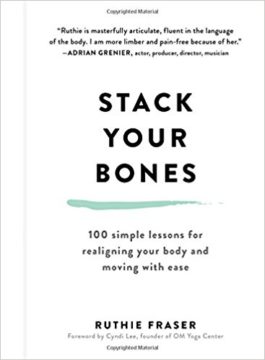 Stack Your Bones is a wonderful resource for alignment and developing body awareness. Start from the beginning or pick a page at random, these 100 lessons provide the opportunity to adjust patterns in your physical body, your body in motion, the experience of your body, and the emotions that live in your body.
Stack Your Bones is a wonderful resource for alignment and developing body awareness. Start from the beginning or pick a page at random, these 100 lessons provide the opportunity to adjust patterns in your physical body, your body in motion, the experience of your body, and the emotions that live in your body.
Your body is a record of your life up to this moment. Stresses, joys, tensions, freedoms, etc. all make a home inside the body and alter our structure and our alignment. As Ruthie mentions, these moments build up and we shift out of balance. Through her work as a Structural Integration practitioner, Ruthie developed lessons that “stimulated experiential learning and contributed to comprehensive body wellness.” These lessons appear in Stack Your Bones to help you and your body re-establish healthy patterns.
The lessons are arranged into four parts: Structure, Basic Movement, Approach, and Contemplations. Structure lessons cue to the physical structure of the body, like stacking your bones, waking up the core, and discovering how muscles work in cooperation. Basic Movement lessons move through alignment, like finding the feet, the pelvic clock, and the undulating movement of the spine. Approach lessons are about exploring how a movement practice works for you, like tuning in to details with curiosity, evaluating what your body needs, and bringing in movements that are counter to regular habits. Contemplations lessons are an invitation to inquire into emotions and even human nature, like noticing layers of tension and protection, pain as a teacher, and experiencing yourself as many pieces.
One lesson, #62 Discernment, invites you to energize your body and widen your eyes. Once you have done that, you are cued to reflect on whether you were already energized and wide-eyed, or you needed to relax. This short practice helps to develop discernment in relationship to your body and your energy, by inquiring into the after-effects of a practice. In LifeForce Yoga, after every breathing practice, you are asked to sense specific body parts, the breath, and the energy, as a means of developing body awareness and learning which techniques are appropriate, or beneficial, or better left to someone else. Without this discernment, one might spend too much time and energy in a practice that is not appropriate.
Stack Your Bones, is an opportunity to get to know your body better. Long term yoga practitioners may find this work helpful as the language and movements may be different than what has become habit.
Order your copy here.
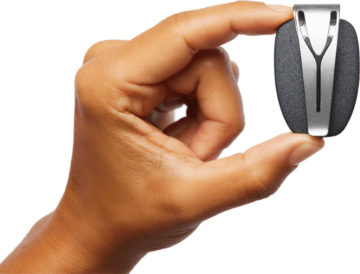 Media Review: Spire Mindfulness & Activity Tracker
Media Review: Spire Mindfulness & Activity Tracker
Reviewed by Rose Kress
Spire is a tool that helps you track your state of mind through your breath. The breath is always present; when the mind becomes anxious, the breath becomes shallow and fast; when the mind becomes calm, the breath is slow and fast. This device, worn on your waist band or bra strap, provides real-time feedback about your breath & state of mind. It records breathing patterns that are Tense, Focused, and Calm, as well as your activity level. All of this information is cataloged on an app on your phone. The app links to your calendar so you can see what you were doing at the time as well as features, like guided meditation, to bring you back to a state of calm.
I was interested in the device for my students and clients. I was also interested to see how my mental activities impacted my breath. I was surprised with the results. Contrary to current research, I am not holding my breath when I check emails and work at my computer. Instead my breath registered as Focused. The times that I registered as Tense were when I was driving on roads with a lot of lights and watching TV. It did not matter which show I was watching, The Simpsons, Friends, or The Walking Dead. This information was quite valuable and explained a number of patterns to me, like why I get so tired at the movies, or why I get tired after driving to certain places in Tucson and not others. In those moments, where I was not breathing, the device would vibrate and remind me to take a deep breath.
I have found Spire to be valuable in my personal life. It also helps me work better with my clients to identify effective breathing practices as well as giving clients greater breath awareness.
Order yours here.